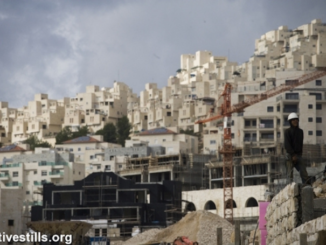
By Fadi Zatari
It is essential to acknowledge that, given Israel’s ideological, strategic, and historical objectives, the prospects for a practical solution remain bleak.
In recent discourse, the enduring dialogue on the two-state solution has re-emerged, invoked by a spectrum of stakeholders, encompassing scholars, activists, and political figures, including influential leaders within the Middle East region.
This conversation inadvertently disregards and neglects the fundamental underpinnings of the protracted conflicts in Palestine, which are deeply rooted in historical events such as the colonization of Palestinian territories, the establishment of the Israeli apartheid system, the ethnic cleansing and genocidal actions perpetrated against Palestinians, the expropriation of their land, and the systemic and severe human rights violations perpetrated by the Israeli Defense Forces and settlers.
Additionally, the sustained blockade of the Gaza Strip, which has transformed it into the world’s most extensive open-air penitentiary, remains an integral aspect of the multifaceted Palestinian conundrum.
The notion of the two-state solution, often characterized as an Israeli construct, is deemed by some as a strategic ploy to divert attention from the structural underpinnings of Israeli apartheid and its associated racial policies.
This concept is positioned as an Israeli myth and a tool of propaganda, periodically resurrected when it serves a particular purpose. As aptly articulated by historian Ilan Pappe,
“The two-state solution is akin to a lifeless cadaver periodically resurrected, meticulously attired, and presented as a vital entity. When it becomes manifestly evident that no vitality remains, it is relegated once more to the figurative morgue.”
Notably, a substantial portion of the Israeli populace espouses the vision of Greater Israel, encompassing not only the territory within Israel’s pre-1967 borders but also the entirety of the Palestinian territories occupied in 1967, including the West Bank, East Jerusalem, and the Gaza Strip.
Moreover, this vision extends beyond the Palestinian territories to incorporate regions of neighboring countries such as Jordan, Egypt, Lebanon, and Syria, underscoring the fact that even within Israeli society, the two-state solution is met with skepticism and opposition.
Where Can the Palestinians Have Their Land?
The question of Palestinian territorial sovereignty and the viability of establishing a Palestinian state within the region presents a complex and contentious issue.
The Gaza Strip, constituting an area that is a mere fraction of historical Palestine, exemplifies the constrained territorial scope available to the Palestinian people.
Meanwhile, the West Bank, encompassing approximately 5,760 square kilometers, remains subject to a significant degree of Israeli military control and settlement presence, rendering comprehensive Palestinian autonomy unattainable.
The pervasive network of Israeli checkpoints and settlements within the West Bank effectively ensures that movement within, to, and from the region is subject to Israeli approval and control.
For Palestinians, navigating through their own cities and territories often necessitates permission from Israeli authorities. These severe restrictions extend to visiting family members in different parts of the West Bank or accessing revered locations such as the Old City of Hebron. Moving inside one Palestinian city is impossible without Israeli approval.
As a Palestinian, I cannot visit my family in Hebron without going through the Israeli gates on the border with Jordan. Worse still, I cannot (almost impossible) visit my Grandfather’s house in the old city of Hebron. For us, the aspiration of visiting Jerusalem (even East Jerusalem) thus remains an elusive dream that Israel appears intent on eradicating from the Palestinian consciousness.
Consequently, the prospects of establishing a Palestinian state, even within the confines of the limited territories of 1967, are profoundly challenged by the relentless Israeli colonization efforts and the entrenchment of an apartheid system.
The prevailing circumstances raise critical questions regarding the feasibility of establishing an independent state and anyone who argues otherwise is invited to attempt to drive from Hebron to Ramallah or from Bethlehem to Jenin, or between any cities in the West Bank.
A significant portion of the historical Palestinian territory is under Israeli military control and heavily settled by Israeli, including ideologically driven settlers.
The notion of a two-state solution has been subjected to intense scrutiny and skepticism, owing to the protracted history of fruitless initiatives, peace negotiations, and peace talks. It has become increasingly evident to the Palestinian population that Israel is not inclined to endorse the establishment of an independent Palestinian state.
No external entity or state has effectively pressured Israel into accepting this solution, and Israeli political leadership exhibits reluctance towards it. Furthermore, some segments of the Israeli population perceive the realization of a Palestinian state as obstructing their vision of a ‘Greater Israel.’
Why is the Two-State Solution a Fallacy?
From a strategic, geographical, and practical standpoint, the notion of a two-state solution is fraught with challenges, as evidenced by the substantial Israeli checkpoints, military controls, and extensive settlements that partition Palestinian cities and impede their cohesion.
In recent decades, continuous Israeli apartheid and colonial policies in the West Bank, East Jerusalem, and the Gaza Strip have rendered the two-state solution increasingly unviable.
The fragmentation of Palestinian territory into isolated cantons underscores the difficulty of dismantling established Israeli settlements unless intensified Palestinian resistance renders them unsustainable in terms of human life and economic costs.
In light of eroding confidence in the political process and the perceived inadequacies of the Palestinian leadership, particularly the Palestine Liberation Organization (PLO) in the West Bank, the Palestinian population is witnessing their land diminishing in favor of Israeli settlers.
This ongoing loss of territory has heightened tensions and contributed to recent escalations, such as those witnessed in the Gaza Strip, with the potential for a broader popular uprising looming on the horizon.
It is essential to acknowledge that, given Israel’s ideological, strategic, and historical objectives, the prospects for a practical solution remain bleak. The current Israeli government exhibits a radical and uncompromising stance, which, in conjunction with its colonial and at times coercive methods, makes the establishment of a Palestinian state within its vicinity highly improbable.
In sum, the outlook for a viable solution appears dim, particularly given Israel’s current political landscape and its uncompromising posture.

– Fadi Zatari is an Assistant Professor in political science and IR department at Zaim University, Türkiye. He contributed this article to The Palestine Chronicle.







